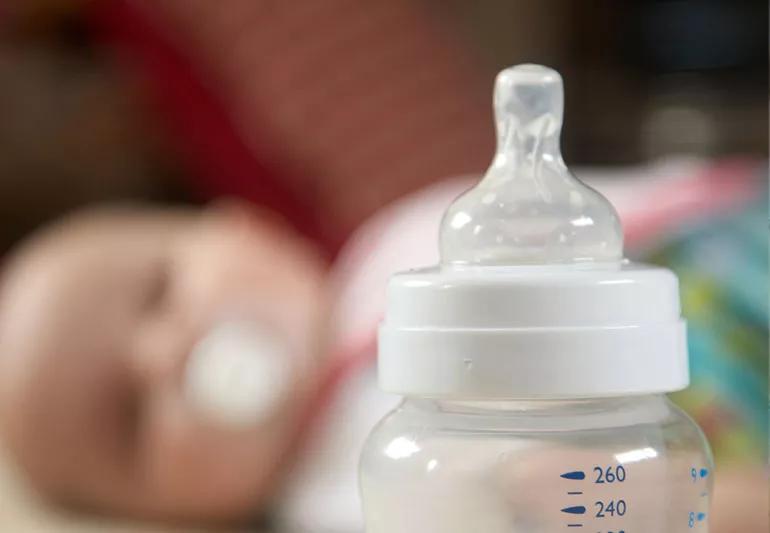Plus, alternatives options to consider

Image content: This image is available to view online.
View image online (https://assets.clevelandclinic.org/transform/8de94b38-8277-4340-848a-9dc18d26b2e6/plasticBabyBottle-157395267_770x553_jpg)
Plastic baby bottle
Plastic baby bottles are convenient, cheap and unbreakable. But are they safe?
Advertisement
Cleveland Clinic is a non-profit academic medical center. Advertising on our site helps support our mission. We do not endorse non-Cleveland Clinic products or services. Policy
Parents breathed a sigh of relief when the U.S. Food and Drug Administration banned the potentially harmful chemical bisphenol-A (BPA) from plastic baby bottles and sippy cups in 2012. Unfortunately, though, BPA may not be the only concerning ingredient in plastic babyware.
“Even a BPA-free plastic bottle has some risk,” says pediatrician W. Kyle Mudd, DO. “But you can take steps to limit risk as much as possible.”
The science of plastics and health is a little fuzzy. Many ingredients in plastic haven’t been thoroughly tested in people. Much of what we know comes from studies in animals.
“We don’t know exactly how all of these compounds affect human health,” Dr. Mudd says. But there are hints that compounds in plastics may be linked to problems.
BPA is one of several bisphenols, which are chemicals used to harden plastics. Since bisphenols can mimic the body’s reproductive hormones, they may affect fertility and the timing of puberty. There’s evidence they may also increase body fat and affect the nervous and immune systems.
Chemicals in plastics pose one problem. But bits of the plastic material may pose another risk. Many plastic bottles and sippy cups are made with the plastic polypropylene. And a 2020 study found that bottles made of polypropylene shed millions of microscopic plastic particles into the liquid they contain. When babies drink from those bottles, they ingest the so-called “microparticles,” too.
Advertisement
So far, scientists don’t know how — or even if — these microplastics might affect health. But until we have more research, use plastic bottles with caution, Dr. Mudd advises.
With some simple steps, you can significantly reduce the amount of chemicals and particles that end up in your baby’s drink.
Some parents choose to avoid plastic altogether, swapping for glass or stainless-steel bottles or sippy cups. These options are safer from a chemical standpoint, Dr. Mudd says.
But they do have some drawbacks. Glass is breakable, of course, which can be a concern with a baby’s little fingers (or, for that matter, an overtired parent’s clumsy fingers). Glass and metal products may also be more expensive, so they’re not an option for everyone.
Heat causes plastics to shed more chemicals and particles, so avoid high-temperature situations. Skip the dishwasher and clean bottles by hand in warm (not hot) soapy water. And don’t ever heat plastic bottles in the microwave.
To minimize exposure to plastic, don’t store formula or breast milk in plastic bottles. Keep it in a glass container in the refrigerator or freezer, and pour it into the bottle just before feeding time. (Discard any leftovers that your baby doesn’t finish during that meal.)
Vigorously shaking a bottle can cause more microplastics to flake off into the liquid. If you need to shake up formula to mix it, do so in a glass or stainless-steel container before transferring it to the plastic bottle.
While it’s helpful to be aware of the risks, don’t lose sleep over your baby’s plastic bottles. (Let’s face it, if you have a baby at home, you’re losing enough sleep as it is.)
Remember, too, that the baby stage will (sigh) be over before you know it. Whatever bottle you choose, it won’t be long before it’s a thing of the past. And if you’re worried about sippy cups, there are non-plastic options for those, too.
“The nutrition your child gets throughout childhood is likely much more important than what kind of bottle you use,” Dr. Mudd says.
In the meantime, you can balance the risks of plastic with reasonable precautions. “Parents should be aware of the potential risks of plastic, but there’s no reason to be overly anxious,” Dr. Mudd adds. “There are always some risks in life. As parents, we just have to do our best to minimize them.”
Advertisement

Sign up for our Health Essentials emails for expert guidance on nutrition, fitness, sleep, skin care and more.
Learn more about our editorial process.
Advertisement
Tiny kidneys and tiny tummies don’t mix well with water
Be assured that the getting-up-at-night phase will pass
Symptoms that should prompt you to call your baby’s doctor
PKU or blood spot test finds hidden conditions early when treatment can be initiated
Most parents report an improvement in breastfeeding, but there’s a chance the procedure won’t solve the issue
All babies go through a perfectly normal peeling phase in the first couple weeks
You can plan for almost anything, but be flexible about the outcome
From learning to change diapers to considering your parenting style, our advice for new dads
Type 2 diabetes isn’t inevitable with these dietary changes
Applying a hot or cold compress can help with pain
Pump up your iron intake with foods like tuna, tofu and turkey